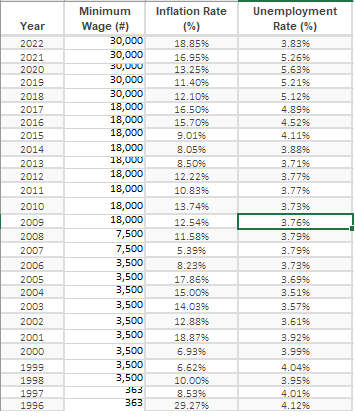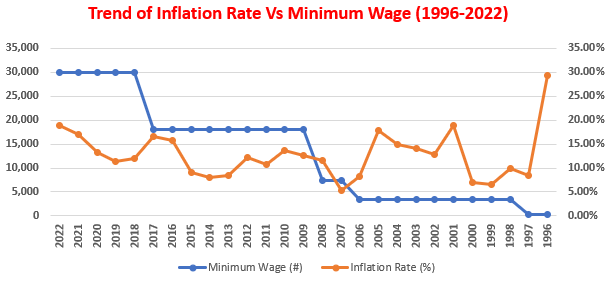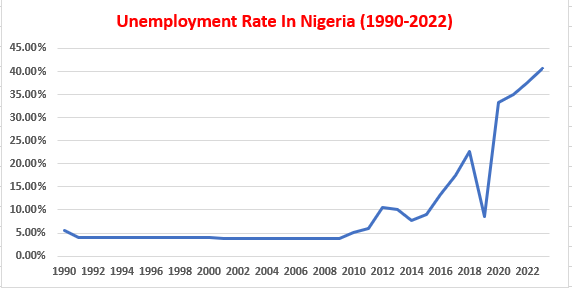By Idowu Faleye, EphraimHill DC
The recent struggle for increase in minimum wage and the rising inflation in Nigeria is a serious economy challenge. Working hard every day but still not being able to afford basic necessities because prices keep going up is heartbreaking and unfair. Many Nigerian families are in this tough situation, and it’s time to find a solution that brings relief and hope. Let’s therefore explore this crucial issue that affects everyone from policymakers to everyday citizens. This blog post break down the findings of our recent study on this important topic.
Read also: The Danger of Unifying Around Ethnic and Religious Differences in the Nigerian
Executive Summary
EphraimHill DC, a leading Research and Data Analytics firm, conducted an in-depth regression analysis to explore the causal relationship between salary increments and inflation rates in Nigeria. This study investigate the impact of wage dynamics on the cost of living to determine whether increasing wages can help control inflation and improve living standards. The analysis is crucial to inform policymakers, government employees, policy analysts, data analysts, data journalists, and to provide actionable insights for economic policy.
Introduction
The ongoing debate about Nigeria’s minimum wage and its alignment with the country’s economic realities has never been more critical. With the current minimum wage standing at N30,000 (approximately US$24) per month, the Nigerian workforce faces a severe erosion of purchasing power due to hyperinflation. Harmonizing minimum wage increment with inflation can create a fairer and more stable economy where everyone has a chance to thrive. This study investigates whether increases in wages can effectively mitigate inflationary pressures and improve living standards.
Hypotheses
Null Hypothesis (H0): There is no significant relationship between salary increases and inflation.
Alternative Hypothesis (H1): There is a significant relationship between salary increases and inflation.
Methodology
EphraimHill DC employed regression analysis to examine the relationship between minimum wage levels and inflation rates from 1996 to 2022. The data was sourced from the National Bureau of Statistics, and Zuhumnan Dapel [Centre for Global Development] and analyzed using Excel’s Analysis ToolPak.

Read Also: Nigerian Masses Struggle with Inequality and Exclusion from the Nations Commonwealth
Regression Analysis on the Impact of Minimum Wage on Inflation Rates
Regression Statistics:
Multiple R: 0.0319532, indicating a very weak positive linear relationship.
R Square: 0.001021, suggesting that minimum wage levels explain only a negligible portion of the variance in inflation rates.
Adjusted R Square: -0.038938, indicating poor model fit.
Standard Error: 0.0511681, reflecting the average deviation of observed inflation rates from the regression line.
ANOVA Results:
Significance F: 0.8742855, indicating that the model is not statistically significant.
Coefficients:
Intercept: 0.1256799 (p-value: 3.642E-08), statistically significant.
Minimum Wage Coefficient: 1.53E-07 (p-value: 0.8742855), not statistically significant.
Key Findings
These findings suggest that minimum wage increment alone do not significantly impact inflation rates. Therefore, a multifaceted approach to economic stabilization is necessary.
Historical Context and Economic Challenges
An historical analysis reveals that Nigeria’s minimum wage adjustments from 1996 to 2022 have failed to keep pace with inflation. Despite periodic revisions, the wages of Nigerian workers have not matched the rising cost of living. One major issue is that 92.3% of Nigeria’s workforce is in the informal sector, where official wage policies have little impact. This means many people are left struggling to make ends meet, even when the minimum wage is increased. This disparity underscores the need for a comprehensive approach to wage reform that includes both formal and informal sectors.

Read Also: Politics Of Redesigning Nigeria’s Currency

Case Studies: Global Perspectives
United States
In the United States, wage increases have been implemented cautiously, and often tied to productivity and economic conditions. For example, the phased implementation of the $15 minimum wage in states like California has been paired with measures to boost productivity and support small businesses. This balanced approach helps mitigate inflationary pressures while enhancing living standards.
Germany
Germany’s introduction of a minimum wage in 2015 at €8.50 per hour was accompanied by robust economic policies, including investment in vocational training and industrial innovation. This strategy helped maintain economic stability and control inflation, demonstrating the effectiveness of a holistic approach.
South Africa
In South Africa, the minimum wage increase in 2019 aimed at reducing poverty was met with mixed results. While it improved living standards for some, it also led to job losses in certain sectors, highlighting the need for careful planning and support measures for vulnerable industries.
Policy Recommendations
Enhancing Productivity
To mitigate the potential inflationary impact of wage increment, Nigeria must focus on enhancing productivity across all sectors. This includes investing in education, vocational training, and technology to improve workforce efficiency and economic output.
Read Also: Transform Nigerian Local Councils into Agric Development Centres

Promoting Agricultural Development
Agriculture holds significant potential for economic growth, employment generation, and poverty alleviation in Nigeria. By modernizing agricultural practices, empowering rural communities, and investing in Agro-processing industries, Nigeria can achieve food security, stabilize prices, and stimulate rural economies.
Fostering Domestic Industries
Reducing dependency on foreign investment by leveraging indigenous resources and capabilities is crucial. Policies should promote innovation, entrepreneurship, and infrastructure development to nurture homegrown industries and value chains.
Comprehensive Economic Policies
Wage adjustments should be part of broader economic policies that include measures to control inflation, support small and medium enterprises (SMEs), and ensure sustainable economic growth. This holistic approach will help balance wage increases with economic stability.
Conclusion
While wage increase is necessary for improved living standards, this study highlights the need for a balanced and holistic approach to wage reform in Nigeria. The research underscores the complexity of the relationship between wage increment and inflation. Wage hikes must be accompanied by strategies to boost productivity and economic growth. Nigeria can achieve sustainable development and prosperity for all its citizens by focusing on agriculture and fostering domestic industries. As policymakers and stakeholders deliberate on the way forward, it is essential to consider a robust strategies that will enhance productivity, control inflation, and promote inclusive growth.
Final Thoughts
As we draw the curtains on this topic, we cannot ignore the recent disclosure that Asian China has flood Nigerian markets with finished products of packaged Gaari (Cassava grains), a staple of Nigerian cuisine. This is an assault to the very core of our national pride and honour. It is the glaring reality of our economic vulnerabilities and a sobering reminder of the urgent need to harness our abundant resources for the benefit of our people. It’s time to harness the nation’s abundant resources to build a future where every Nigerian can thrive and prosper, and also to build a future of self-reliance and prosperity for the nation. Let’s rise above this national shame.
References:
National Bureau of Statistics (Nigeria)
Zuhumnan Dapel, IDRC Fellow, Centre for Global Development
Case studies on minimum wage policies in the United States, Germany, and South Africa
Thank you for reading, and stay tuned for more updates on Nigeria’s economic landscape!
For further details and insights, visit EphraimHill DC’s official website -https://www.ephraimhilldc.com.
Born in Ekiti State- Nigeria, Idowu Faleye is an IBM certified Data Analyst with an academic background in Public Administration. He is the Proprietor of EphraimHill DataBlog, a website that regularly provide Data-driven Contents, Information Products, and Blogpost Writings. He’s also the Lead Analyst at EphraimHill DC, a Data analytics Consulting Company. He can be found on ephraimhill01@gmail.com and +2348132100608












































![The Trend of Insecurity in Nigeria. [Part 2]](https://ephraimhilldc.com/wp-content/uploads/2024/09/Computer-Monitoring-of-Remote-areas.png)



































